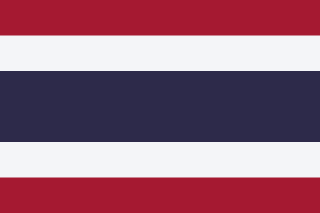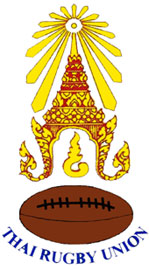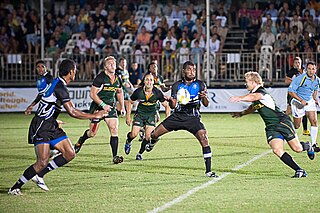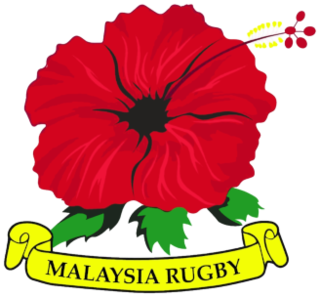
The Thailand national football team represents Thailand in senior international football and is controlled by the Football Association of Thailand.

The Vietnam national football team represents the Vietnam in men's senior international association football and is controlled by the Vietnam Football Federation, the governing of football in Vietnam. The team's nickname is the Golden Star Warriors.

The Malaysia national football team represents Malaysia in international football and is governed by the Football Association of Malaysia. The national team is recognised by FIFA as the successor of the defunct Malaya national football team which was founded for the 1963 Merdeka Tournament one month before the institution of Malaysia. The team is officially nicknamed Harimau Malaya in reference to the Malayan Tiger. Former player Mokhtar Dahari is one of the top goal scorers in international history.
The Singapore national football team represents Singapore in the senior men's international football. It is organised by the Football Association of Singapore (FAS), the governing body of football in Singapore, which is affiliated with the Asian Football Confederation (AFC) and the regional ASEAN Football Federation (AFF). The team's colours are red and white. Singapore are colloquially known as "The Lions".

The Hong Kong national rugby union team, nicknamed the Dragons, has made the qualifying rounds of the Rugby World Cup. Rugby union in Hong Kong is administered by the Hong Kong Rugby Union since 1952, and successfully competes annually in the Asia Rugby Championship.

The Thailand national cricket team is the team that represents Thailand in international cricket. The team is organised by the Cricket Association of Thailand, which has been an associate member of the International Cricket Council (ICC) since 2005, having been an affiliate member between 1995 and 2005. Almost all of Thailand's matches have come against other Asian teams, including in several Asian Cricket Council tournaments.

The Sri Lanka national rugby union team, known as the Tuskers, represents Sri Lanka in men's international rugby union. The team has yet to make their debut at the Rugby World Cup. They have the longest tradition of organised club rugby in Asia, dating back to 1879, which was just 8 years after the founding of the world's first rugby union in England. They regularly compete in the Asian Five Nations tournament and are currently in Division I. In the 2010 tournament, they made it to the finals beating Chinese Taipei 37 to 7.

The Thailand national rugby union team represents Thailand in men's international Rugby union. The Thai national team is yet to play at the Rugby World Cup, but has been playing in qualifying tournaments since the 1999 Rugby World Cup in Wales.

Rugby union in Asia is governed by the Asian Rugby Football Union (ARFU). As of December 2009 there are 28 ARFU member unions, of whom 15 are full members of World Rugby, and six further associate members of World Rugby in Asia. The flagship tournament for promoting the sport in Asia is the Asian Five Nations, which launched in 2008, and which most recently in 2011 saw the national teams of Hong Kong, Japan, Kazakhstan, Sri Lanka and the UAE, compete in the main tournament.
Rugby union in China is a growing sport; however, it is still not overly popular. China became affiliated to the International Rugby Board in 1997 and as of 1 July 2019, its women's XV side was ranked 24th and its men's XV side 80th in the world. Neither the women's team nor the men's team has yet qualified for a Women's Rugby World Cup or a men's Rugby World Cup. However, China has hopes of one day hosting the men's event, and World Rugby has indicated it supports taking the event there.

The Singapore Cricket Club International Rugby Sevens is an annual rugby sevens tournament hosted by the Singapore Cricket Club (SCC). The event is one of the premier international club tournaments in Asia, involving teams from around the world. The trophy for the tournament, the Ablitt Cup, is named after Mr Bernard E Ablitt who was Convenor of the SCC Rugby Section from 1931-2 and President of the club from 1938-9. The silver Ablitt Cup was donated by Mrs Katherine Parentis in 1947 for the winners of the first seven-a-side tournament organised by the SCC Rugby Section. The tournament has since become an annual competition and one of the world's oldest rugby sevens competitions.

Rugby union in Malaysia is a sport with a long history, and a significant participation. There are 41,050 registered players, and the country is currently ranked 47th. There are sixteen unions, associations and councils affiliated to the Malaysian Rugby Union, more than 300 clubs, and 600 schools which teach the game. Malaysian rugby's most notable contribution to the game at large is the invention of rugby tens.

Rugby union is not a major sport in Singapore. Singapore is currently ranked 58th in the world and 6th in Asia. As of February 2015, there over 12,000 registered players, with more than 2,000 women playing the sport. There are also 15 formally organised clubs with 4 registered Women's sides.

Malaysia Rugby, formerly known as Malaysia Rugby Union(Malay: Kesatuan Ragbi Malaysia) is the governing body for rugby union in Malaysia. It was founded in 1921 and joined the International Rugby Football Board, later known as the International Rugby Board and now as World Rugby, in 1988. They organize the annual Malaysia Sevens tournament and few local tournament

COBRA 10s is the world's premier rugby tens tournament which is organized annually by the COBRA Rugby Club of Malaysia. The tournament is held each November at the MBPJ Stadium in Petaling Jaya, Malaysia.

The Asia Rugby Women's Sevens Series is the regional championship for women's international rugby sevens in Asia. Initially contested as a single tournament, the championship was expanded into a two-tournament series in 2014. The competition is sanctioned and sponsored by Asia Rugby, which is the rugby union governing body for the region.

The Philippines national rugby sevens team is a minor national sevens side. The 2012 Hong Kong Sevens was their first appearance in an IRB Sevens World Series. They were 1 of 4 Asian teams that qualified through regional tournaments to be included in the 2012 Hong Kong Sevens, it is also a qualifying tournament for inclusion in the 2012–13 IRB Sevens World Series. After the Philippines won third place against South Korea in the 2012 Singapore Sevens Series, they gained qualification to the 2013 Rugby World Cup Sevens in Moscow. The Philippines finished third at the 2018 Asia Rugby Sevens Series, and qualified to the 2019 Hong Kong Sevens World Series qualifier. At the tournament, the team defeated Zimbabwe and advanced to quarter-finals, where they lost to Asian rival Hong Kong.
The Singapore women's national sevens rugby union team is Singapore's national representative in Rugby sevens. They competed at the 2017 and 2018 Asia Rugby Women's Sevens Series.
The MCKK Premier 7's 2014 was the fourth edition of the annual, invitational Malay College Rugby Premier Sevens, which involved teams from Malaysia premier schools, states champions and international schools. It was scheduled from 28 February till 2 March 2014. For the fourth edition of the Tournament, the number of international teams invited has increased from three teams in the previous Tournament to five teams. This year, teams from New Zealand and South Africa, two Test Playing Rugby Nations, will feature for the first time in the Tournament together with debutant Singapore. Thailand and Hong Kong will also be returning this year. The tournament is also on the verge of being recognized by International Rugby Board with help by Malaysian Rugby Union. The tagline for this tournament is "Premiering Talent and Sportsmanship". Initially, Brunei Sports School were confirmed of participating the events before pulling out in the final minute.
The 2016 Asia Rugby Championship division tournaments refers to the divisions played within the annual international rugby union tournament for the Asian region. The Asia Rugby Championship (ARC) replaced the Asian Five Nations tournament in 2015. The main tournament is now contested by the top three teams in Asia. The other national teams in Asia compete in three divisions.















